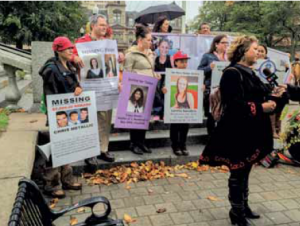
Spirit on the streets
Sisters in Spirit march to honour missing Aboriginal women
Sisters in Spirit march to honour missing Aboriginal women
Despite the rain and wind, a crowd gathered at the Grand Parade this Saturday for the Sisters in Spirit vigil. Afterwards was a solidarity march that ended at the Mi’kmaq Native Friendship Centre on Gottingen Street. The event was held to commemorate the memory of missing or murdered Aboriginal women in Canada.
Research has shown a disturbing reality in Canada – a disproportionate number of aboriginal women are missing or unaccounted for. They are also more likely to deal with poverty, and more likely to be victims of human trafficking and murder.
Sisters in Spirit organized the vigil. They research, educate and advocate better policies in Canada for aboriginal women. According to the vigil’s Facebook page, “Nearly half of murder cases involving Aboriginal women and girls remain unsolved; by contrast, as of 2005 84 per cent of all homicide cases in Canada were cleared by police.”
But there has been renewed attention on missing or murdered women – the recent murders of Loretta Saunders and Tina Fontaine have put faces behind the issue.
Yvonne Boyer is the Canada Research Chair in Aboriginal health and wellness in Brandon, Manitoba.
“The whole concept of what’s happened to aboriginal people in this country is reflected in the murdered and missing women, and the apathy that’s gone along with that as well,” says Boyer.
Across Canada there have been calls for a national inquiry to the violence aboriginal women face. In response to the public calls, Prime Minister Stephen Harper said, “They’re not all one phenomenon […] We should not view this as a sociological phenomenon. We should view it as crime.”
Gail Clark is a field worker for Amnesty International’s Nova Scotia and New Brunswick regions. Clark says Harper is just one voice.
“There are more voices out there and Amnesty speaks for those voices,” says Clark.
Harper is against seeing the discrimination aboriginal women face as anything more than acts of violence committed by individuals, and not as a systemic problem in society.
By calling the cases of missing and murdered women as instances of individual crimes, Harper denies there is a widespread problem in Canada regarding the treatment of aboriginal women.
It means that he, and by extension we, don’t have to do anything or question why these women are going missing in Canada.







